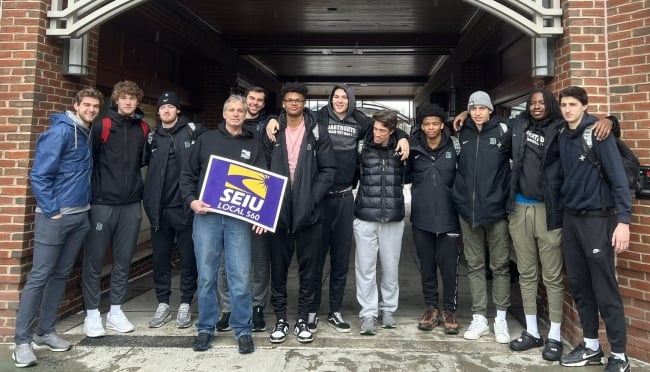By Meron Squires for HR Daily Advisor
With March Madness in full swing, thousands of us will gather around to watch young, talented athletes battle for the coveted National Title. Many of us are drawn to college basketball because of what it represents: young, motivated students playing their hearts out in the hopes of having a career in the NBA.

In the past, collegiate sports could distinguish itself from professional leagues because these athletes were student-athletes, not employees, primarily focused on receiving a higher education. This mindset was challenged in Trustees of Dartmouth College, 01-RC-325633, in which the National Labor Relations Board (NLRB), Region 1 reclassified the definition of a college men’s basketball player from a student-athlete to a student-employee.
Here, Dartmouth argued the players on the team don’t meet the common-law test for “employee” under Section 2(3) of the National Labor Relations Act (NLRA) because the players don’t perform work in exchange for compensation. The Board disagreed. Instead, it considered benefits such as equipment, apparel, tickets to the game, lodging, and meals as “compensation.” The Board further ruled Dartmouth benefits from the athletes’ work because it generates alumni engagement and publicity and that Dartmouth exercises significant control over the players’ work. Thus, according to the NLRB, the 15 members of the men’s basketball team are “employees” within the meaning of the NLRA and are considered an “appropriate unit for the purpose of collective bargaining.”
One month following this landmark decision, the Dartmouth men’s basketball team voted to unionize with the Service Employees International Union (SEIU) in a 13-to-2 vote on March 5, 2024. Many believe this is just the beginning. How will the NLRB’s decision and the subsequent successful election impact other college basketball programs and universities? What will this mean for the sport of college basketball? How will it impact recruiting and the game itself? For now, it’s too early to tell. Dartmouth has appealed the NLRB ruling, and the case could ultimately land in federal court, which could potentially delay collective bargaining negotiations.
College basketball is just one of the many industries touched by this growing movement toward organizing. With thousands of workers across all industries gravitating toward a more union-friendly workforce, what can you do as an employer when faced with union organizing?
Employer Do’s and Don’ts
- Ensure company policies and procedures comply with federal and state laws.
- Conduct annual market surveys to ensure rates are consistent with comparators.
- Ensure managers treat employees fairly and consistently pursuant to company policies.
- Conduct annual management training so managers know the early signs of union activity.
- Educate management on what you can/can’t say during an active election.
- Have an internal plan on the company’s position if there is union activity.
- Identify benefits of remaining union-free, neutrality, or voluntary recognition.
- Obtain legal counsel that specializes in labor/employment and union organizing.
